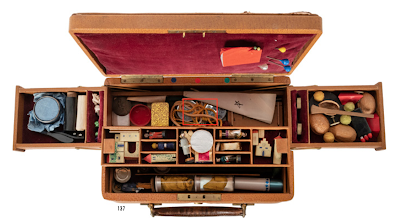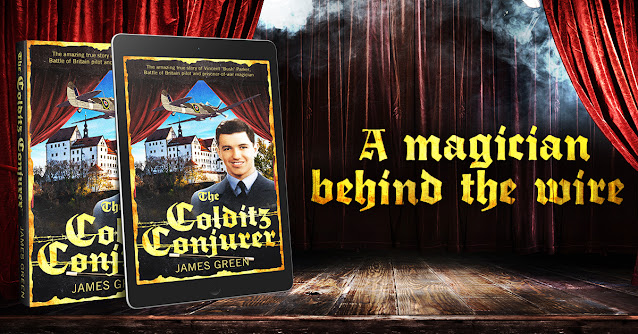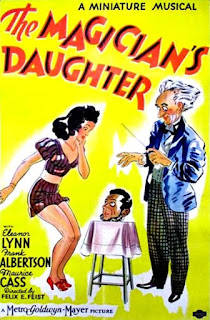Punx: A POW magician in Wales (and the story of the friendship clock)
A German magician in a Welsh prisoner-of-war camp discovers how the brotherhood and art of magic can transcend war.
Some of the magicians who served as sailors, soldiers and airmen in World War Two, inevitably became prisoners-of-war (POW). Those serving with the Allied Powers ended up in the hands of the Axis Powers led by Nazi Germany, the Empire of Japan and Fascist Italy, or vice versa.
The majority of POWs from the Axis Powers were captured by the Soviet Union, who held 3 million POWs in thousands of camps. Others were captured and held by the Western Allies and dispersed throughout the world. In Britain, at its peak, there were 390 major POW camps to house half a million POWs or surrendered enemy personnel (SEP). Another 400,000 prisoners were sent to the U.S.A. Countries in the British Empire, such as Australia, Canada and India, also took in POWs.
One Axis soldier to end up incarcerated in Britain, was a German magician called Ludwig Hanemann.
Ludwig Franz Wilhelm Hanemann was actually born in England in 1907, to German parents. He moved to Germany as a boy and became an amateur magician after seeing Dante (Harry Jansen) (1883-1955) perform, making his debut in 1930. He co-founded the Bremen branch of the Magischer Zirkel von Deutschland (The Magic Circle of Germany) in 1932, whilst working as an advertising salesman for his day job.

Ludwig Hanemann in an early semi-professional performance, 1937
(Source: ‘Farewell Performance’ by Punx)
In August 1940, Hanemann was conscripted into the German Army and served as an NCO in the medical corps, until he was captured in France in August 1944, two months after the Allied D-Day landings. Captured by the French, he was transferred to the Americans and then the British, who sent him to Wales.
Hanemann was held in Camp 184 in Llanmartin, Monmouthshire (Gwent). Like many POW camps in the U.K., Camp 184 was originally built to house the U.S. Army prior to the D-Day landings. Almost as soon as they left for Normandy in June 1944, it was turned over to the large number of Germans being captured following the invasion. Two to three thousand German personnel were held at Llanmartin and put to work in nearby farms or forests.
A group of Nissen huts among trees at a German POW camp, somewhere in Britain
(Source: IWM Non-Commercial Licence)
Under supervision of the camp guards, Hanemann mainly worked on forestry tasks in the hills of South Wales. As an English-speaker, he was also used as an interpreter between the guards and other prisoners. The conditions were not oppressive and when off-duty Hanemann found time to practice and think about his magic:
“I had a good time, at least up to the end of the war. I could do whatever I wanted to do. And what could I have better done than to practice sleight of hand with the modest materials available, and to think of new routines?"
One day, in late 1944 or early 1945, a member of the Y.M.C.A. (nicknamed 'You May Come Again' but actually the Young Men’s Christian Association) visited the camp. He spoke to each prisoner and asked if they had any welfare requests:
"I had only one request: 'Tell my friend Davenport that I am here.'"
'Mr. Davenport' was Lewis Davenport, the founder of L. Davenports Ltd., a leading London-based magic dealer, who knew Hanemann before the war. They had travelled together to the Welt Kongress Der Zauberer (The World Congress of Magicians) in Munich during September 1936.
"After 14 days the Y.M.C.A. man returned, called me into his barracks and placed two briefcases on the table: 'From Mr. Davenport.' They contained more than 50 packs of Players cigarettes. You cannot imagine what that meant in this situation. Cigarettes were worth more than money, because there was almost nothing to buy in the camp. But cigarettes were THE currency. Yet this was just the overture to a festival of thankfulness and friendship.”
“Two weeks later, a second miracle came into the Medical Barracks, where I had lain for eight days with a foot inflammation. I lay in the last, that is, the rearmost of 20 beds, when the door opened and there stood a very large Englishman with a black beret."
The Englishman was Reg Granger from the Royal Tank Regiment, newly assigned to Camp 184 to oversee the POWs:
"He had a package under his arm and said in perfect German: 'Is Medical NCO Hanemann here?' I reported, and he came to my bed and now he spoke English. He placed the heavy package on my knee: 'From Lewis Davenport.' He sat down on my bed and told me an almost unbelievable story. He had been in a German prisoner of war camp for four years. He had been a camp leader, and had just returned a few days before. He lived near London, in Windsor. He had been visiting his father in London, who asked him to take something over to Davenports to be repaired. His father did magic. Reg Granger took the item to Davenports, and took this opportunity to tell Davenport about his current activities. 'What,' Davenport asked. 'You work in a POW camp?' Shortly, it transpired, it was my camp. Davenport wrapped up a package for me and gave it to Granger to take with him."
"When I unwrapped the package, I cried like a baby. Only a magician who has been in a similar position can understand how I felt. Here I was, cut off from God and all the world, without my beloved magic, and there before me were all of the things I needed - a magic wand, silks, balls, playing cards, coins, boxes, nail writers, cups and balls, billets, envelopes, magician’s wax, and the list goes on. He had not forgotten anything. In addition, there were a half dozen brand new books with tricks that had never been heard of in Germany. It was like a Utopia for me. Now life could go on, and it did go on."
With his new props, Hanemann performed regularly for his fellow prisoners and developed a sell-out variety show called Simlalabim, in a nod to Dante’s catch-phrase Sim Sala Bim. Appearing under the stage name, Punx, he performed manipulation, general magic, mentalism and even homemade illusions.
"With Davenport’s material and some illusions that we built in the camp, I put together some two hour shows with professional lighting and music. I even had real posters painted. Admission was one penny. Above all, I developed my craft."
Hand-drawn poster for Simlalabim magic and variety show in Camp 184
(Source: ‘Farewell Performance’ by Punx)
Hanemann gave performances to the British guards and even a magic show for local school children, arranged by Mr. Stevensen a forester who oversaw one of the POW working parties:
“The day came. More than forty little souls between 5 and 14 years old stood nervously in front of our barracks and waited for forester Stevensen. They were afraid of the German soldiers without their protector. At 5 o’clock sharp, he brought them in. Then they sat around the large table on long benches, laughed nervously, and looked around in confusion. Stevensen said a few words to dispel their inhibitions, but it didn’t work ... Then I began and made a little world of wonder come to life before the eyes of the children. Slowly the invisible barrier between the grey POW and the Welsh farm children began to lift. They gaped, whispered, and giggled. Then when I made bright, shiny shillings spring out of their noses, the spell was broken. They clapped their hands, laughed, asked questions, and wanted to inspect my pockets and sleeves."
When the show was over, something astonishing happened. One of the elder foresters with Mr. Stevensen walked over to Hanemann and the children and addressed the group:
"He spoke, haltingly at first, but deep from his heart, 'I want to thank you,' he said to me, 'because that is my boy, Roland over there, whom you have made so happy. Look, Rolly, this is a German, one of those people who the newspapers say are so evil. Haven’t I always told you that all people are the same, whether they are English, German, or Chinese?' Then he said to all of them, 'This German, who has just brought you joy for an hour, is an innocent prisoner. He, too, has children at home, who are waiting for him, and a wife. And they are all homesick. There must be peace, and soon, so all of these men can go back home. Not the peace that Mr. Churchill is making. Peace must come from Jesus Christ. Let us pray for the German prisoners and their wives and children.' Forty little pairs of hands folded themselves, and forty enchanted children spoke in chorus, repeating the words of the old man. It was a long prayer, and afterwards, the Our Father ... One very little one did not know the words. He just stood entranced, with his big eyes glowing. And the POWs wiped their eyes with their rough, threadbare sleeves.”
Conditions worsened near the end of the war and after the German surrender in May 1945, the POWs were put on half rations due to shortages of food. But, Hanemann was content, helped by the regular parcels from Lewis Davenport, couriered to him by Granger, and the reputation he gained among the prisoners and guards:
"After each weekend, Granger would come back from his weekend leave to bring me something. Every month he brought - among other contraband — £1. He was like Santa Claus. At that time, I was also doing shows for British troops, so I almost had a 'position,' so I did not have to put up with a lot, nor did I have to suffer under the yoke of captivity. So, it got to be a really beautiful time. Who else could say that about military captivity? What could I do, in my situation, to express my thanks to Davenport?"

Advertising poster for one of Punx's post-war magic shows
(Source: Unknown)
In fact, Hanemann did come up with a way to repay Davenports' kindness. He commissioned one of his fellow POWs, Sergeant Ernst Pape, to make a clock for the Davenport family; despite electrician Pape having no prior experience of making clocks. Hanemann paid for the clock using some of the £1 notes Lewis Davenport had sent. Over several months, using only the rudimentary tools available in the camp, Pape crafted a fully-working wall clock, embellished with pictures familiar to magicians, with a Davenport Demon trademark on the pendulum and the emblem of the Magischer Zirkel von Deutschland on the weight.
A speechless Reg Granger took delivery of the clock and took it to the Davenport’s store in central London. When he returned, he reported - visibly overcome - about the wonderful moment which he had experienced when he presented the clock. It moved Lewis Davenport to such an extent that he put the clock in his shop's display window and made a sign for it that said:
“This clock was given to me by a German magician, who is in one of our prisoner of war camps.”
(It was removed two days later as the police said, “it was creating a public disturbance.”)
Friendship Clock, made by German POWs in Wales, presented by Punx to Lewis Davenport (1945)
(Source: The Davenport Collection)
(Source: The Davenport Collection)
Although the war in Europe ended in May 1945, it took some time for Axis POWs to be repatriated to Germany, which was in turmoil. Nazi Germany was defeated and occupied by Britain, France, the U.S.A. and the Soviet Union. There was severe hunger and deprivation among the German population after six long years of war.
Hanemann was repatriated to Germany in 1946. He was helped to get back on his feet by German magician Helmut Schreiber (who later performed as Kalanag), president of the Magischer Zirkel von Deutschland (The Magic Circle of Germany). Punx loaned Schreiber the magic books he had been given by Lewis Davenport, along with a sketchbook of magical ideas and projects he'd designed while held as a P.O.W. Later, while he was grateful that Schreiber found him work entertaining British troops in occupied Germany, Punx was somewhat annoyed that Schreiber copied many of his ideas.
Punx became a professional magician, specialising in mentalism. Over time, he became renown for performing ‘magic as theatre’. He revolutionised magic performances by putting together a complete stage play around magic, performing as four different characters. He was one of Germany’s most famous and successful magicians of the Twentieth Century. A long-standing member of the Psychic Entertainers' Association, he became its dean in 1989. During the height of his fame, Punx was as well-known in Germany as David Copperfield is in the United States.
Recognising his skilful and ground-breaking artistic performances, Punx's fellow German magicians appointed him as the third recipient of the Hofzinser Ring, one of the most important awards in German magic. It is given to those that most closely emulated the strivings of Johann Nepomuk Hofzinser (1806-1875) to present magic artistically. The ring was passed to Punx by German magician Kalanag, who had held it from 1936.
(Source: Wittus Wit)
"Punx was artistic, yet controversial. He would go to almost any lengths to produce a perfect presentation. At his peak, his manipulative and sleight of hand skills were flawless ... A great performer, a wonderful writer, an original thinker, an outspoken critic (in all senses of the word!), a good friend, Punx always wondered what lay on the other side of the veil that separates this world from the next," wrote magician Bill Palmer, translator of Punx's books.
Punx retired in 1985 (passing the Hofzinser Ring to Werner Geissler-Werry) and died in 1996.
Punx performing his 'The Heart of Glass' trick
(Source: YouTube)
Punx's friendship clock still exists today in the Davenports' private collection. The Hofzinser ring is now held by Jan Loggeman (since 2020).
In October 2021, Punx's props box was sold at auction by Potter & Potter:

Punx's props box
(Source: Potter & Potter)
Quoted text taken from two of Punx's books, 'Farewell Performance' and 'Magical Adventures and Fairy Tales', translated from German to English by Bill Palmer.
Update (March 2022): Having written this blog back in September 2021, I was fortunate this month to see the Friendship Clock close-up in The Davenports' Collection (with kind thanks to John and Anne Davenport for arranging the visit). It is impressively detailed and extraordinary, given its origins in the prisoner-of-war camp in wartime Britain.
Fred Maldino (1911-2003) was another famous German magician held as a POW by the British. Look out for a future blog on Maldino's wartime story.
Related article: Paul Potassy: "Magic saved my life", a blog post about an Austrian magician captured by the Soviets and sent to a prisoner-of-war camp in Russia. Blog link.
Related article: 'The Magician of Stalag Luft III' (Parts 1-3) tells the story of Lieutenant Commander John Casson naval aviator, magician, prisoner-of-war in Stalag Luft III. Blog link
Related article: Magic at the Movies, a blog about magic-related movies made during World War Two to keep the public entertained, including one featuring Dante alongside Laurel & Hardy. Blog link
Research supported by The Good Magic Award 2021 from The Good Thinking Society

*** AVAILABLE NOW ***
The Colditz Conjurer tells the amazing true story of Flight Lieutenant Vincent ‘Bush’ Parker, Battle of Britain pilot and prisoner-of-war magician.
Written by the Magic at War team, The Colditz Conjurer is a remarkable tale of perseverance, courage and cunning in the face of adversity. It features over 55 original photographs and maps. 126 pages.













Comments
Post a Comment